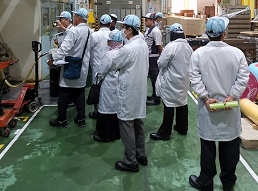
ECCJ implemented a carbon neutrality diagnosis in Malaysia in the FY2023 energy conservation support project for ASEAN countries
<Dispatch of experts>
Under the instruction and financial support of the Agency for Natural Resources and Energy (ANRE), the Energy Conservation Center, Japan (ECCJ) implemented a carbon neutrality (CN) diagnosis in NITTO DENKO Materials (Malaysia) Sdn. Bhd. (NMM) during the three-day period between September 25 and 27, 2023 as part of the current fiscal year’s AJEEP (ASEAN-Japan Energy Efficiency Partnership) Scheme 5 program. Data gathering and data analyses were implemented through conducting preliminary surveys and on-site investigations, and the first draft of the CN measures was proposed.
(1) Explanations of the CN project formation, guidelines and practical CN diagnosis procedures
(2) Interview surveys based on preliminary survey data, on-site investigations, data measurements and data analyses
(3) Analysis of on-site investigation results, explanations of CN diagnosis results and proposal of the first draft of the CN measures
|
| ||
| Greetings | View of on-site investigations | View of discussions |
As part of the current fiscal year’s AJEEP Scheme 5 program, a CN diagnosis was implemented for the first time in the ASEAN region. NITTO DENKO Materials (Malaysia) Sdn. Bhd. was selected as the subject for the industrial sector’s first CN diagnosis, and the diagnosis was implemented over the three-day period between September 25 and 27. Before proceeding with the diagnosis, explanations of the CN project formation, CN guidelines and practical CN diagnosis procedures were given, and then the diagnosis was implemented in an actual factory. The factory’s qualified energy managers, ASEAN trainers and ASEAN Centre for Energy (ACE) representatives participated in the diagnosis, and guidance for conducting diagnoses was provided by Japanese experts. At the same time, ECCJ also visited the JETRO Kuala Lumpur office and the Ministry of Natural Resources, Environment and Climate Change (NRECC) to explain the objectives of the activities and to request their cooperation and support for activities going forward.
(1) ECCJ explained the CN project formation, CN guidelines and practical CN diagnosis procedures, gaining the understanding of the persons in charge of implementing the CN diagnosis.
(2) In the interviews that were conducted based on the preliminary survey data, the validity of the question contents provided by ECCJ were confirmed.
(3) ECCJ confirmed the facility operation conditions through on-site investigations, conducted data measurements and data analyses, and proposed an eight-item CN draft plan. Regarding the proposal contents, ECCJ will calculate the CO2 reduction and continue discussions for formulating the medium to long-term plans.
(4) An online meeting will be held mid-way through November to give a summary of the results this time, and ECCJ provides support for the creation of a report on the CN diagnosis results for completion by the intermediate check meeting which is to be held in February.
(5) ECCJ visited the JETRO Kuala Lumpur office and NRECC, where ECCJ explained the objectives of the AJEEP Scheme 5 program and requested cooperation and support going forward, gaining the representatives’ understanding.
(6) Considering the company’s production plans and investment plans, we aim to formulate medium to long-term plans by August next year for realizing CO2 reduction. In this consideration, ECCJ will give recommendations to realize CO2 reduction by introducing new Japanese technologies, which will contribute to creating benefit for Japanese companies.


